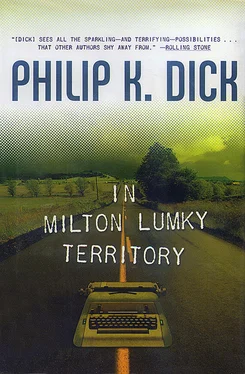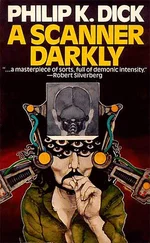Philip Dick - In Milton Lumky Territory
Здесь есть возможность читать онлайн «Philip Dick - In Milton Lumky Territory» весь текст электронной книги совершенно бесплатно (целиком полную версию без сокращений). В некоторых случаях можно слушать аудио, скачать через торрент в формате fb2 и присутствует краткое содержание. Город: New York, ISBN: , Издательство: Tom Doherty Associates, LLC, Жанр: roman, на английском языке. Описание произведения, (предисловие) а так же отзывы посетителей доступны на портале библиотеки ЛибКат.
- Название:In Milton Lumky Territory
- Автор:
- Издательство:Tom Doherty Associates, LLC
- Жанр:
- Год:неизвестен
- Город:New York
- ISBN:978-0-7653-1695-0
- Рейтинг книги:4 / 5. Голосов: 1
-
Избранное:Добавить в избранное
- Отзывы:
-
Ваша оценка:
- 80
- 1
- 2
- 3
- 4
- 5
In Milton Lumky Territory: краткое содержание, описание и аннотация
Предлагаем к чтению аннотацию, описание, краткое содержание или предисловие (зависит от того, что написал сам автор книги «In Milton Lumky Territory»). Если вы не нашли необходимую информацию о книге — напишите в комментариях, мы постараемся отыскать её.
In Milton Lumky Territory — читать онлайн бесплатно полную книгу (весь текст) целиком
Ниже представлен текст книги, разбитый по страницам. Система сохранения места последней прочитанной страницы, позволяет с удобством читать онлайн бесплатно книгу «In Milton Lumky Territory», без необходимости каждый раз заново искать на чём Вы остановились. Поставьте закладку, и сможете в любой момент перейти на страницу, на которой закончили чтение.
Интервал:
Закладка:
Milt said, “I’m sorry you called Cathy. There’s no reason why she should have to drive out here. I’ll be up and around in a day or so and there’s no reason why I can’t go back there on the Greyhound.” He lay back and stared up at the ceiling. Presently he said, “I hope you swing the deal for the typewriters.”
“I hate to leave,” he said, “with you still sore at me.”
“I’m just upset,” Milt said.
“Don’t worry about me,” he said.
“Okay,” Milt said.
“Even if I don’t believe in God,” he said, “I can still have a full life.”
Milt said, “There’s just something dead in you.”
“No,” he said.
“You’re like these scientists making H-bombs,” Milt said. “Cold as hell, rational as hell.”
“But no soul,” Bruce said.
Milt nodded.
“Maybe we’ll all be blown up,” Bruce said. “And then it won’t matter.”
“I’d be willing to bet that even that wouldn’t faze you.”
“It would,” he said.
“You wouldn’t even notice,” Milt said.
He began gathering up his things from the bathroom, packing them into the opened suitcase.
“Maybe it would be a good thing after all,” Milt said. “The bomb, I mean. Maybe it would wake people up.”
“I doubt it,” he said. “I doubt if it would be a good thing.”
“People have to face reality sometime.” He said it with bitterness and conviction.
After he had packed up his things, Bruce went down to the motel office and told the owners the situation. He gave them Cathy’s phone number, and, as an afterthought, Susan’s and his own in Boise. To wind it up he wrote out the name and address of Milt’s company. And he made it clear to them that Milt had enough money to maintain himself; he wanted to be sure that Milt would be well-treated after he left.
“Don’t worry about him,” the woman said, accompanying him to his car. “We’ll keep our eye on him.” Cheerfully, she helped him unload Milt’s things.
He carried the bundles and suitcases into the cabin. “Well, I’ll see you,” he said to Milt. He paused in the doorway. “Take it easy.”
“Take it easy,” Milt said, not looking at him. “Don’t take any wooden nickels.”
Presently he had driven out onto the road, leaving the motel and Milt behind.
13
He reached Seattle that evening and at once parked at a gas station and telephoned Phil Baranowski at the number Milt had given him.
“It’s pretty late,” Baranowski said, when he had explained what he wanted and who he was. “It’s ten o’clock.”
Not having realized how late in the evening it was he said, “What about early tomorrow?” Anyhow he needed sleep; he did not feel fit enough to talk business after having been all day on the road.
They agreed to meet at nine-thirty in the morning at a downtown street corner that Baranowski assured him he would have no trouble finding. Baranowski gave him no clue to his chances; he simply said that he would be willing to discuss the machines and that was that.
Hanging up, he felt disappointed. All the distance he had covered…here he was now, face to face with the man who actually owned a warehouse of the machines. And it was an ordinary voice on the other end of the phone, a business-like voice much the same as any other.
The next morning he parked at me corner and waited for Baranowski to show up.
At a quarter to ten a thin, dark-haired man wearing a shiny blue double-breasted pin-stripe suit came striding along the sidewalk toward the Merc. He appeared to be in his middle forties. Waving to Bruce he leaned down to the window and said, “Want to go in your car or mine? Might as well take yours.” He jumped in beside Bruce, and they drove off, Baranowski giving him directions. The man had an animated, terse manner; his eyes shone and he gestured continually. He seemed honest but overworked. Bruce had the feeling that to Baranowski the stock of typewriters did not amount to much. The man had a fixed idea of their worth and he would not let them go for less. But to him the amount was small; it was one inventory from among many, and as they drove from downtown Seattle toward the warehouse, Baranowski gave him an idea of some of these other involvements. Evidently the man’s main interest lay in the direction of imported optical equipment from Japan and Europe, lenses and prisms and binoculars and microscopes. He told Bruce that he had started out years ago as a lens-grinder for a Portland firm that made eyeglasses; eventually he had opened his own shop in partnership with an optometrist, and then he had gone into warwork during the ’forties, and now into this. He no doubt had direct contact with exporters in Japan who supplied him his lenses, and the typewriters had shown up as one of their sidelines.
“Milt thought I could pick them up for around fifty dollars each,” Bruce said, as he parked near a large wooden warehouse across from a chemical company which had its tanks up on stilts. The pavement was irregular, broken down by trucks.
“Milt was being optimistic,” Baranowski said, getting out of the car. “Did he mention that they’re all in original cartons?” With a key he unlocked a side door of the warehouse and the two of them entered.
The place was dark and dry. Baranowski switched on several overhead lights. “I can give you up to four hundred of them. Absolutely identical.” He reached up to the top of a pile of small square cartons and lifted one down; handing it to Bruce he showed him the stenciled code markings. “You’d be surprised how many times we run across other stuff in cartons, not what it’s supposed to be. But these are what it says. We had them checked over before they left the shipper.” He told Bruce, then, about a wealthy retired broker who had ordered a case of Cutty Sark Scotch, and when it had come he had opened it and found the wood crate filled with bricks. “And that was from Scotland,” Baranowski finished up.
“Can I open this?” Bruce asked.
“Please do.”
He opened the carton and lifted out the typewriter. Sure enough, it was what he had seen in the store window in San Francisco. “Can I plug it in and try it?” he asked. The machine seemed unexpectedly light. No heavier than a book. And smaller than he remembered. But the workmanship appeared good; he examined the various screws, and they had all been driven in properly and finished up with the heads evenly countersunk.
Baranowski patted him on the shoulder. “Take it along with you,” he said. “I’m in kind of a rush. You go back to your motel or wherever you’re staying and give it the works. Give it the hardest treatment you can. I’ve got one I’ve been using for six months; no trouble at all with it. They’re beautifully built.” He switched off the lights and led Bruce toward the door. On both sides of them, in the gloom, the cartons of Mithrias had been piled up, one on top of another, an entire cavern of them. And, beyond them, he saw larger cartons, other machines. “You make certain you’re satisfied and then you give me a buzz. Okay? You know where to find me.”
They drove back to the downtown business section, and Baranowski told him where he wanted to be let off. The last Bruce saw of him he was striding off into an office building, his hands thrust deep in his pockets. The Mithrias remained on the car seat beside Bruce. The man, without hesitation, had left it with him, without ever having laid eyes on him before.
In his motel room he set the typewriter up on the bed, plugged it in, and placed a batch of typing paper and carbon paper beside it. Too bad, he thought, that I’m not a typist. He switched it on and the thing began to hum. But he did know something about machinery. Almost at once he could see that a great deal of ingenuity had gone into it. The carriage return intrigued him; it did not operate by means of a pulley, but by the use of a simple spring and lock system, like the release of a crossbow. Two strike pressures could be obtained, light for one carbon, heavy for several. The key-touch pressure could not be changed except by adjusting a screw from the back. Tabs had to be set from the back, too, and manually, as on the old pre-war machines. That did not matter, however. The main thing was the sturdiness of its construction and the general swiftness and dependability of its action. Rolling in two sheets of paper he began to type. The thing was noisy—the keys struck with a sharp clack—but such was the case with all electrics. He discovered that once a key had been pressed down, the letter would not restrike until the key had been let completely up. So there was little chance of accidental multiple strikes. With two fingers, the best he could manage, he began typing the letters f and j as rapidly as possible. He found that he could not confuse the action; it kept well ahead of him. So it represented a genuine electric, in its speed and in its light touch.
Читать дальшеИнтервал:
Закладка:
Похожие книги на «In Milton Lumky Territory»
Представляем Вашему вниманию похожие книги на «In Milton Lumky Territory» списком для выбора. Мы отобрали схожую по названию и смыслу литературу в надежде предоставить читателям больше вариантов отыскать новые, интересные, ещё непрочитанные произведения.
Обсуждение, отзывы о книге «In Milton Lumky Territory» и просто собственные мнения читателей. Оставьте ваши комментарии, напишите, что Вы думаете о произведении, его смысле или главных героях. Укажите что конкретно понравилось, а что нет, и почему Вы так считаете.










